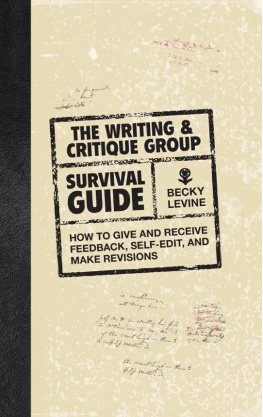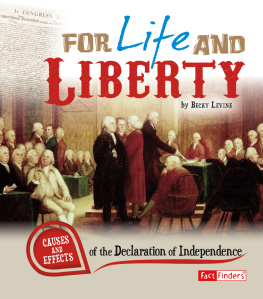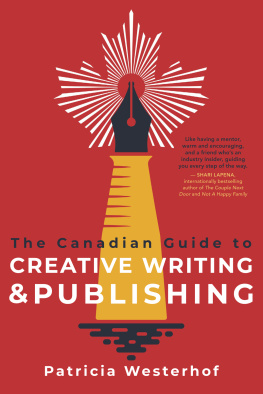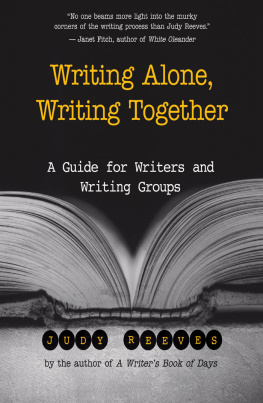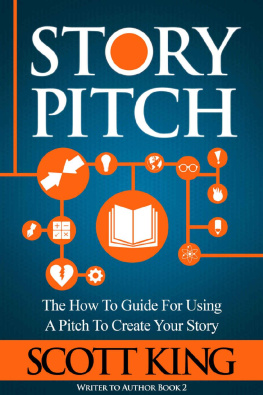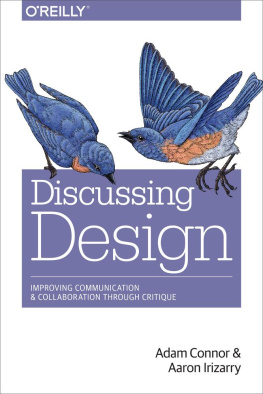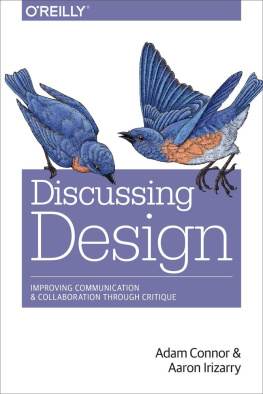Dedication
To Oakley Hall, for starting me down the path to this
book so many years ago.
To David and Ian, for giving me the time, love, and
support I needed to stay on that path.
About the Author
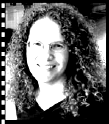
Becky Levine is a freelance writer and has participated in critique groups for almost fifteen years. A past columnist for WritersTalk (the newsletter of the California Writers Club, South Bay branch) and a past reviewer for The Horn Book Guide, Becky has written features for newspapers such as The Palo Alto Weekly and The Santa Cruz Sentinel. She speaks regularly at writing clubs and conferences. She is also a member of the Society of Childrens Book Writer and Illustrators (SCBWI), Sisters in Crime (SINC), Romance Writers of America (RWA), and the California Writers Club (CWC). Visit her website and blog at www.beckylevine.com.
Acknowledgments
I am lucky to live in a world of writers and readers who make my life full and keep me sane. So many people helped me on the way to this book. Lee Lofland and Hallie Ephron set up the opportunities that led me to Writers Digest Books in the first place. Jane Friedman and Kelly Nickel guided me through the proposal process, and my agent, Jessica Faust, held my hand through the contract phase. My editor, Scott Francis, has been wonderful, making everything incredibly easy and helping me make this book the best it could be.
This book would not have been written if it werent for Beth Proudfoot and Terri Thayer, who applied their critiquing superpowers to the manuscripthelping me brainstorm structure, reviewing every page, and pushing me to get things just right. Beth, Terri, Cyndy Furze, Martha Alderson, Jackie Seymour, and Jana McBurney-Lin have been my writing and critique support for more than a decade. These are the people you never let go of. Many local and online writers let me pick their brains about critique groups and writing in generalSusan Taylor Brown, Debbi Michiko Florence, Jim Averbeck, Darcy Pattison, Matilda Butler, Cheryl Reifsnyder. If you havent gotten yourself out there on the Web yet, do it: The writers Ive met through blogs, Facebook, Twitter, and the Writers Market community are the best cheering section anyone could ask for.
Finally, thank you to my parents, Gaby and Ken Levine. They created a world for me, when I was growing up, in which there was no such thing as too many books or too many hours spent reading. Without that magic, I wouldnt be here today, doing this writing thing I love so much.
INTRODUCTION
I have always known I wanted to be a writer. I have also always known I didnt want to live in a cold, dark garret, starving for my art.
It would be too lonely.
When I was in college at UC Irvine, I found out that writing didnt have to be lonely. I took writing workshops from Oakley Hall, and in those classes I got my first taste of writing as part of a community. I learned much from those classes about my own writing and about how to make good comments and suggestions. I learned how much I would benefit from belonging to a critique group.
Every one of you who has picked up this book knows horror stories about critique groups. Youve met or heard about the critiquer who trashed the authors story and sent her home in tears. Youve listened to the critiquer who couldnt find anything constructive to say, and youve watched the author who couldnt hear the feedback he was being given. These stories are mythic, legendary in the writing world. Unfortunately, theyre also true.
Thats why Ive written this book. Ive been in strong critique groups and groups that werent so great. Ive seen poor communication between critiquers make for some nasty moments, and Ive watched writers struggle, not knowing what to do with the feedback they are getting about their books. Ive also seen the success of writers who have joined or built a great group, in which the members support each other in all the important wayswith encouragement and with detailed, thought-out critiques. I believe that most writers can learn to give respectful and useful critiques, and that they can also develop the strength to hear those critiques and work with them to take their manuscripts to a higher level of writing.
I also believe that writers need a set of tools to succeed at these goals.
My hope is that this book will provide you with those tools.
The information in this book is broken down into several sections. The first chapters give you information and instructions about finding and joining a strong group or starting your own group. The middle section contains chapters that show you how to get started critiquing various genres of writing: fiction, nonfiction, and books for young readers. After that, the next chapters tell you how to self-edit and revise your work, using the feedback youve gotten from your critique partners. Finally, I talk about the ways you can make a strong group for the future, building on the community youve developed to support the growing skills and successes of the groups writers.
You may want to read this book all the way through to get a sense of the big picture of critiquing and working with a critique group. Or, if youre settled in with a strong group already but are looking for specific help critiquing the kinds of work your group is doing, you can dip into the relevant chapters and get tips on how to dig in. If your group is going through some changing times, and youre worried about how you can all continue to work together, check out the last section, including the chapter about troubleshooting the dynamics of a group.
Throughout the book youll find worksheets that you can use to organize your critique group and plan your critiques. For your convenience downloads of the worksheets are available (with extra space for your notes!) at http://writersdigest.com/article/critique-survival-guide.
Yes, finding and maintaining a strong critique group can be hard. Its a challenge. So is your writing, though, and you do everything possible to keep that at the top of your priority list. Do the same with your critique group. The magic of a good group makes all the struggles worthwhile, and strong critique partners can help you make every one of your writing dreams come true.
Without my critique partners, I would never have come as far in my own writing as I have. This book would never have been written or published. I wish for you a critique group that gives you the same support, strength, and community I have found in mine.
Section I
GETTING STARTED:
THE BASICS OF A CRITIQUE GROUP
Do you have a few chapters or a complete manuscript sitting in front of you, ready for critique and revision? Have you gotten a book proposal accepted by an agent, and now youre looking at putting real chapters onto paper? Are you playing with bits and pieces of your memoir, wondering about getting help putting them together?

